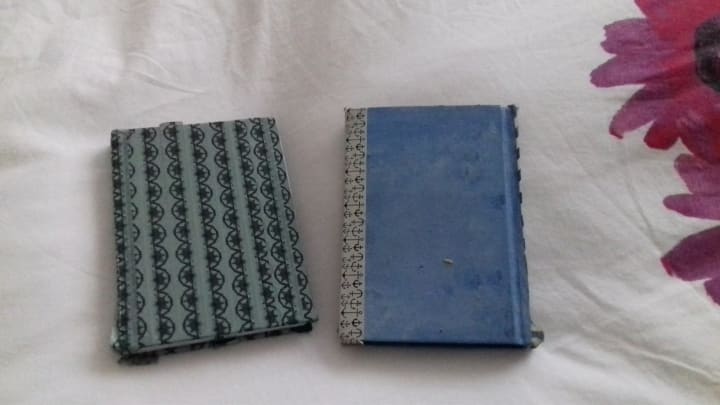How to Lead a 'Normal' Life With Depression and Anxiety
How I've learned to cope with the 'normal' world.

A few years ago, before I was "allowed" to speak about my mental health, things were at their worst. I was 17, going through college and just learning about the world. I was severely anxious and at the time I'd only just learned what anxiety was. The thing about depression is that it's not just sadness, it can be a symptom for some people, but it can manifest in rage, antisocial behaviour, sleeping or not sleeping, eating too much or not eating at all, it's a really subjective illness and it's different for a lot of people. I had trouble coping with friendships and relationships, jealousy, fear and anger consumed my mind. Amidst all the episodes you can have it can be hard to navigate through everyday life, I remember it being like a thick fog with no chance of clearing. So I've compiled a list of things that helped me and hopefully will help you.
1. Talk About It
It may seem like a pretty simple thing to say, but speaking to friends and family who you know will understand really helps. It's always good to build a support network of people you trust who can be there when shit hits the fan.
2. Seek Professional Help
Therapy waiting lists can be up to six months in the UK and even then there is no guarantee they'll be good so it's understandable that people will turn to sites such as 7 Cups of Tea for someone to lend an ear, although they're good, remember that they're not professional help and won't help you to create coping mechanisms for the future. If you are in dire need of help, call a crisis line, talk to the doctor about how bad it's getting or consider paying for counselling. Getting professional help really helps when it comes to study or work as then you also have evidence of your illness and these settings become much more understanding in the process.
3. Have A Creative Outlet
I'm not the most creative person, I can barely draw a stick man but nonetheless when your mind is cluttered it's good to organise things. I tried everything, I invested in colouring pencils and a sketchpad but this didn't work out. Eventually I'd got some paints and some stickers and hadn't worked out what to do with them, so I decided to buy two cheap notebooks and keep one for my Positive thoughts to look back on when I needed it and one for my Negative thoughts just to get them out. I decided to decorate them too without titles so I'd know which one was which but outsiders wouldn't know what the journals were.
4. Don't Let Anyone Enable You

My "Negativity" and "Positivity" journals, I'll let you guess which one is which.
The thing about anxiety and especially depression is that at the end of the day they are still illnesses and people may want to help but if they enable you things won't get any better. Enabling can lead to a break down of relationships with your loved ones and dependency which can be toxic. I used to have a friend who when I was in my bad state would kindly look after me, but this lead to me not getting off my butt to do things for myself. Sometimes it can feel like your body weighs a ton and it can be hard to get out of bed, its nice when people help and sometimes you need it, but be mindful of these things for example if someone cleans your room for you think about little steps you can take to help. I used to create myself a to do list of tiny little tasks like taking a shower or getting one assignment done or eating a healthy meal and I'd tick them off when I'd do them, they really helped when it came to getting on track and not getting stuck in a rut.
5. Consider All Options Of Help
A lot of people nowadays are afraid of anti-depressants and anti-anxieties. I was one of the people who didn't want to be on tablets as I was afraid of how it'd affect my body. But after receiving Counselling, CBT and EMDr it became clear to me that I needed more than just therapy to help me. I tried four different types of medications before finding which was right for me, but the one I am currently on has helped millions and I am slowly being taken off them as they helped that much. Another thing is that it's important to be honest with yourself and your doctor when meds don't work for you, they can up and reduce the dose and change your medication until it's right for you. Saying this, medication doesn't always work for everyone, you know your body best so try everything and if it's not your cup of tea don't do it. Remember there is no quick fix for mental illness and nothing will work immediately.
6. Don't Overdo It
It can be easy to overwork yourself when you're having a good few days or even just a good day, but then when the bad day hits you can find yourself exhausted. Although growth and productivity is important, leave yourself time for mental health days and don't feel bad about it, practice self care, do face masks, have naps, even just binge watch Game of Thrones. You can do this on your own or with friends whichever is best for you and is most relaxing. If you're on your own always make sure there is someone there who you can pick up the phone and talk to or text if you feel like you need someone.
7. Try To Eat A Balanced Diet
This is the difficult one, sometimes it's hard to eat when you suffer from anxiety and depression and sometimes you eat and eat all the wrong things (like me). If you can't eat, I'd recommend drinking nutritious milkshakes as they have vitamins you need, or something I'd do is eat cereal as although sugary it contains iron, vitamins and minerals you need. Try to eat fruit and vegetables when you can and try to make sure they're in with your shop or ask a friend to pick some up for you. I'm not the type of person who would say this can solve your illness, but it will prevent further health problems and make your body feel better in the long run. Exercise can also help, even if it's just cycling to work or going to swimming once a week, it's always better if it's something you enjoy.
8. Try To Get Into A Routine
This is the most important thing you can do for recovery. It's also one of the hardest things you can do, which is why apps such as Any.do or Wunderlist are great. Even planning things out in a planner will help with this sort of thing. It's not always easy to plan as things can be unpredictable so don't get yourself down if you're not always in routine, but try to keep one. For example although my work hours are sporadic when I am at work I always wake up at 7am (unless I'm in earlier) and I get a bath, wash my hair, do my makeup, put on my clothes and relax with watching Netflix. Then I go to work and I know I've usually got three hours till a break, these little milestones keep me going and stop me looking at the clock. Creating things to look forward to makes the days easier for me.
9. Get Rid Of Toxic People
It's not always easy to do this; they might be family or coworkers so if someone is toxic to your mental health who you can't get rid of, remember to pay them no mind. Remind yourself they have things they're going through too and just be as civil as you can; if they ask you out places politely decline or say you have plans.When you can though, block people on social media or slowly cut off contact with people who negatively effect your mental health.
I'm not here to tell you what is healthy and what isn't.

https://www.ntas.org.uk/mental-health/
I'm not here to tell you what is healthy and what isn't and you're probably riling that I left this on an odd number, but I have so much more to say that if I did I'd be here all day, so I'll write a second article soon. I've been diagnosed for five years and have learned a lot in that time. There has been a mental health revolution in the past few years and things are getting better, but they're not always easy. If these things don't work for you that's okay too, you do you. Just look after yourself and remember that I as well as others in this world are just glad you're still here with us.
Now go out and shake what your momma gave you.
Warmest Love.
About the Creator
Ruby-Jessica Smith
22 years old, Psychology degree, Pansexual and long term sufferer of Depression, Anxiety and BDD. I post life advice about mental health, makeup and how to function in every day life as a young person.






Comments
There are no comments for this story
Be the first to respond and start the conversation.